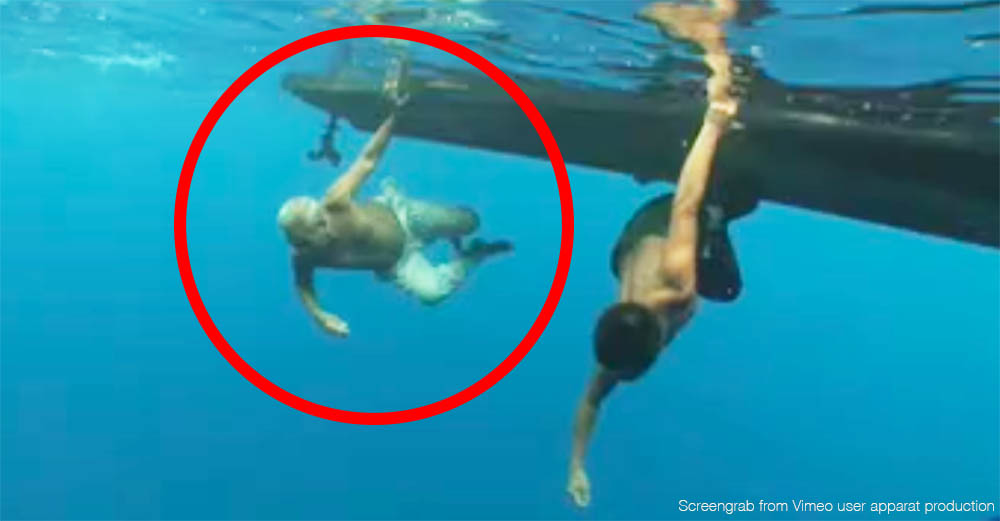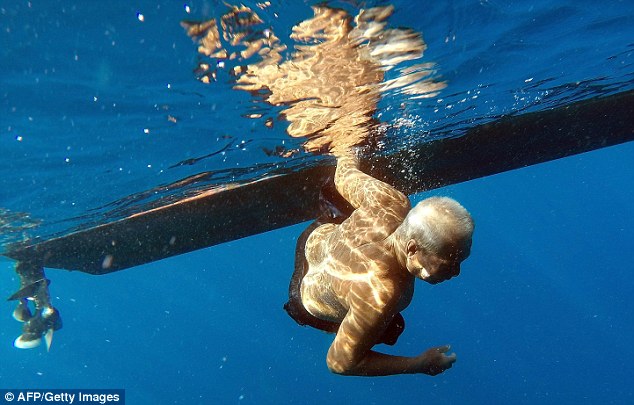The amazing story of how this Terengganu man catches fishes by LISTENING to them

- 2.3KShares
- Facebook2.2K
- Twitter16
- LinkedIn5
- Email13
- WhatsApp58
If you were to meet Harun Muhammad on the streets, you may think at first glance that he is just somebody’s normal, boring 70-plus year old grandpa. But if you were to meet Harun, say, in the middle of an ocean during a fishing trip or something, you may think that he’s some kind of Malaysian Aquaman.

By trade, Harun is a fisherman living in Setiu Lagoon, Terengganu, albeit a very specialized one. Harun only fishes for a type of saltwater fish called the ikan gelama (or soldier croakers), armed with just a simple boat and a net. Without sonar or other high-tech fish detection devices at his disposal, how can he find out where the fish are in the ocean, and a very specific kind of fish at that? By listening to the fish’s sounds, of course.
Harun is one of the few remaining fish-listeners, a dying trade in the face of modern fishing boats and high-tech equipment. In fact, he was reported to be the only active fish-listener left in Malaysia, and maybe the whole world. To search for gelama, Harun would drop off the side of the boat and submerge himself in water. Keeping one hand on the boat, Harun then opens his ears and eyes to the sounds of the ocean.
‘After a while, it is as if you can see. Even though the fish is very far, you can sense it in that direction and you go there. Only when you get close, you can hear the fish clearly,’ – Harun, for Daily Mail UK.
He would then send another boat with nets to the fish’s location, and he would scare the gelamas into the net by beating on the sides of his own boat. The fish, once caught and sold, can earn him and his team an average of RM7,000 a week.
Having been listening to fishes for a long time, Harun claimed that different fishes make different sounds. According to his experience, fish are intelligent creatures capable of identifying the sound of fishermen’s boats and being able to warn their friends by ‘screaming and shouting’. Yep, contrary to popular belief, fishes can get pretty noisy.
Just like birds, fishes use sounds to communicate too
Most people only see fishes either in the aquarium, in the freezer or at a seafood restaurant, and chances are they’re all pretty quiet. As long as you feed them and clean their tanks regularly, fishes are basically silent living ornaments. But, as Harun and people who work closely fish already know, fish can communicate with each other using a variety of sounds. Some species have even been found to ‘sing’ in chorus at dawn and dusk, much like birds.
In case you didn’t click on the video, it’s a recording of fish off the Australian coast during dawn. The continuous mosquito fogging sound throughout the video is believed to have been made by the blackspotted croaker (Protonibea diacantus), while the soft bass grunts heard at intervals is believed to be from a species of terapontid. The science community have only very recently started to study fish sounds, and so far what we know is that a fish may make sounds, or vocalize, in three different ways:
- By drumming on their gas-filled swim bladders using a specialized muscle.
- By stridulation, or rubbing bony parts of their body together, like a cricket.
- By swimming aggressively, changing turns in the water and what not. Sounds made this way are usually unintentional.
But the methods are not limited to this three. Marine biologists are discovering new ways fishes talk to each other, like how herrings fart to communicate. The scientists who discovered this behavior named the phenomenon as Fast Repetitive Ticks (FRT), and it sounds just like it’s acronym, only higher pitched.

This sound, accompanied by a string of fine bubbles emanating from the fishes’ anuses, is believed to have been used by herrings to specifically communicate with one another, as it happens more commonly in response to darkness or a huge number of herrings congregating, but not as frequently when starved or when in the presence of sharks or other predators.
So it’s not impossible for gelamas to have their own unique sound (their English name is ‘croaker’, anyway), and Harun claimed that he utilizes that sound to find them. However, some have expressed skepticism in his ability as he may go a full week without ever hearing any gelama sounds. But that’s probably just because…
Illegal fishermen are probably causing the gelama’s population to decline
The Setiu lagoon, where Harun is fishing, is part of the Setiu wetlands, a rich coastal ecosystem which is now threatened by modernization. Sand dredging and aquaculture activities have affected the natural ecosystem of the wetlands. While there had been plans to protect the wetlands by turning it into a park, there is still the problem of overfishing in the area.
In 2007, the Terengganu State Fisheries Department revealed that the reason Terengganu fishermen were getting less and less fish was because of illegal foreign fishing vessels snapping up all the fish. And while we’re catching some 800,000 tonnes of fish every year, only about half of that makes it to shore. The other half was sold off to foreign vessels in the middle of the sea. One of the solutions involved having fishing vessels catch a minimum amount of fish every year if they were to renew their licenses.
“Deep sea vessels must record a minimum 250 tonnes of fish landings in a year, for those using pukat tunda (trawl net) and 350 tonnes for those using pukat jerut (purse seine – a wall of netting placed in an area). Only if they make the minimum landings can they renew their licences,” – Datuk Munir Mohd Nawi, director general of the Fisheries Department, for The Star.

While action is being taken to address the problem, one might wonder if the minimum landings rule will push the guilty vessel operators to catch even more fish to make up for the amount they sold off to foreign vessels, leading to overfishing. Overfishing is, simply, catching fish faster than they can reproduce. It’s a no-brainer that overfishing will have negative impacts on the ecosystem, but it can also affect people in the fishing industry as well.
Fish takes time to grow, and if overfishing continues at its current rate, all the fishermen will be able to catch are tinier, younger fish. Certain species of fish might become rarer as well, leading to a reduction in supply, driving the prices up. Such is the case with Harun and his team, who are finding it increasingly difficult to locate gelamas these days. Back in 2014, Harun reported his catch as becoming increasingly unpredictable, having to dive and listen dozens of times before even hearing a hint of gelamas.
While overfishing does make the job harder, fish-listeners are facing a much bigger problem.
Modernization is killing off fish-listening

While Harun’s trade was a culture not found elsewhere in the world, with the advent of advanced fishing equipment and technology like sonar imaging as well as it being noisier underwater with all the boats, less and less people are interested to pursue the art of fish listening. Even the existing fish listeners are switching to more modern methods of detecting fish. To put it bluntly, fish listeners are dying out.
Right now, Harun is training his son, Zuraini, as an apprentice fish listener. And despite long odds of fish listening in the future, Zuraini don’t want to see the practice die out. He also plans to train his son in the art of fish-listening. But it’s not something that can be taught overnight. According to Harun, a trained fish listener as himself can differentiate between schools of mackerel, sardines or gelama from far off only after many years of experience.
“Nobody can teach us this art. We learn from the fish themselves. The fish teach us. You must gain the skill and learn the lay of the water… The wholesalers tell me, ‘if you’re gone, there will be no more gelama’,” – Harun, for The Borneo Post.
Whether fish-listening can survive the modern fishing world will remain to be seen, but as of now, it would seem that the art’s fate rests within the hands of Harun and his descendants.
- 2.3KShares
- Facebook2.2K
- Twitter16
- LinkedIn5
- Email13
- WhatsApp58


